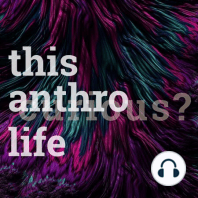48 min listen
Death Work: The Life and Culture of Forensics with Lilly White
FromThis Anthro Life
ratings:
Length:
44 minutes
Released:
Sep 30, 2020
Format:
Podcast episode
Description
When most people think of forensics or forensic anthropology the first thing that comes to mind are TV shows like CSI or Bones, or maybe in Six Feet Under.
This may sound overly obvious, but people die every day. And this means that every day someone has to deliver dealth notifications to next of kin, especially when people live apart. Often times coroners are the ones who deliver these notifications. Coroners are elected or appointed public officials whose primary duty is to determine and certify cause of death.
and while they have the scientific knowledge to do so, sometimes with the help of apps and digital tools, the social part of dealing with death, both for next of kin and the coroners themselves, is often ignored.
We all experience death at some point but across 2020 more people have been directly impacted by death than ever before due to COVID-19. Meaning that more people than ever are receiving death notifications, which was a difficult conversation even before the pandemic. These notifications are challenging to give, Imagine knocking on a door or picking up the phone delivering the news that someone has passed away. It’s essential work. And it’s not easy. It’s also deeply social and cultural.
This is why I’m talking to Lilly White a forensic anthropologist who focuses on the cultural side of forensics, especially on the lives of coroners and medical examiners and the best ways to handle death notifications. Lily got her PhD from the University of Montana in 2019 and currently owns and operates Bones and Stone Anthroscience with her husband.
So today we’ll be talking about how cultural anthropology can play a role in forensic anthropology especially with death notifications.
Top Takeaways
We dig into the unseen/secret life of coroners (from a cultural perspective)
Death notice work is essential but emotionally difficult so there’s a struggle keeping coroners in the practice
The challenges of scientific training and having to deliver the worst possible news; the mix of scientific and social knowledge
We’ll open the conversation like I often like to do, with Lily’s story and how she found her way into forensics and forensic anthropology, what life is like training to be a coroner, and her path to running her own forensics business today.
Read about Lilly’s work in NYC with COVID-19 deaths (University of Montana)
Lilly’s Instagram: Bone & Stone Anthrosciences (@deathphd) • Instagram photos and videos
What is a Coroner?
Episode art: Sara Schmieder
---
This episode is sponsored by
· Anchor: The easiest way to make a podcast. https://anchor.fm/app
· Charity Promotion: Democracy Works: This advertisement is part of a charitable initiative in partnership with Democracy Works. howto.vote
---
Send in a voice message: https://anchor.fm/thisanthrolife/message
Support this podcast: https://anchor.fm/thisanthrolife/support
This may sound overly obvious, but people die every day. And this means that every day someone has to deliver dealth notifications to next of kin, especially when people live apart. Often times coroners are the ones who deliver these notifications. Coroners are elected or appointed public officials whose primary duty is to determine and certify cause of death.
and while they have the scientific knowledge to do so, sometimes with the help of apps and digital tools, the social part of dealing with death, both for next of kin and the coroners themselves, is often ignored.
We all experience death at some point but across 2020 more people have been directly impacted by death than ever before due to COVID-19. Meaning that more people than ever are receiving death notifications, which was a difficult conversation even before the pandemic. These notifications are challenging to give, Imagine knocking on a door or picking up the phone delivering the news that someone has passed away. It’s essential work. And it’s not easy. It’s also deeply social and cultural.
This is why I’m talking to Lilly White a forensic anthropologist who focuses on the cultural side of forensics, especially on the lives of coroners and medical examiners and the best ways to handle death notifications. Lily got her PhD from the University of Montana in 2019 and currently owns and operates Bones and Stone Anthroscience with her husband.
So today we’ll be talking about how cultural anthropology can play a role in forensic anthropology especially with death notifications.
Top Takeaways
We dig into the unseen/secret life of coroners (from a cultural perspective)
Death notice work is essential but emotionally difficult so there’s a struggle keeping coroners in the practice
The challenges of scientific training and having to deliver the worst possible news; the mix of scientific and social knowledge
We’ll open the conversation like I often like to do, with Lily’s story and how she found her way into forensics and forensic anthropology, what life is like training to be a coroner, and her path to running her own forensics business today.
Read about Lilly’s work in NYC with COVID-19 deaths (University of Montana)
Lilly’s Instagram: Bone & Stone Anthrosciences (@deathphd) • Instagram photos and videos
What is a Coroner?
Episode art: Sara Schmieder
---
This episode is sponsored by
· Anchor: The easiest way to make a podcast. https://anchor.fm/app
· Charity Promotion: Democracy Works: This advertisement is part of a charitable initiative in partnership with Democracy Works. howto.vote
---
Send in a voice message: https://anchor.fm/thisanthrolife/message
Support this podcast: https://anchor.fm/thisanthrolife/support
Released:
Sep 30, 2020
Format:
Podcast episode
Titles in the series (100)
Altered States of Consciousness - This Anthro Life by This Anthro Life
